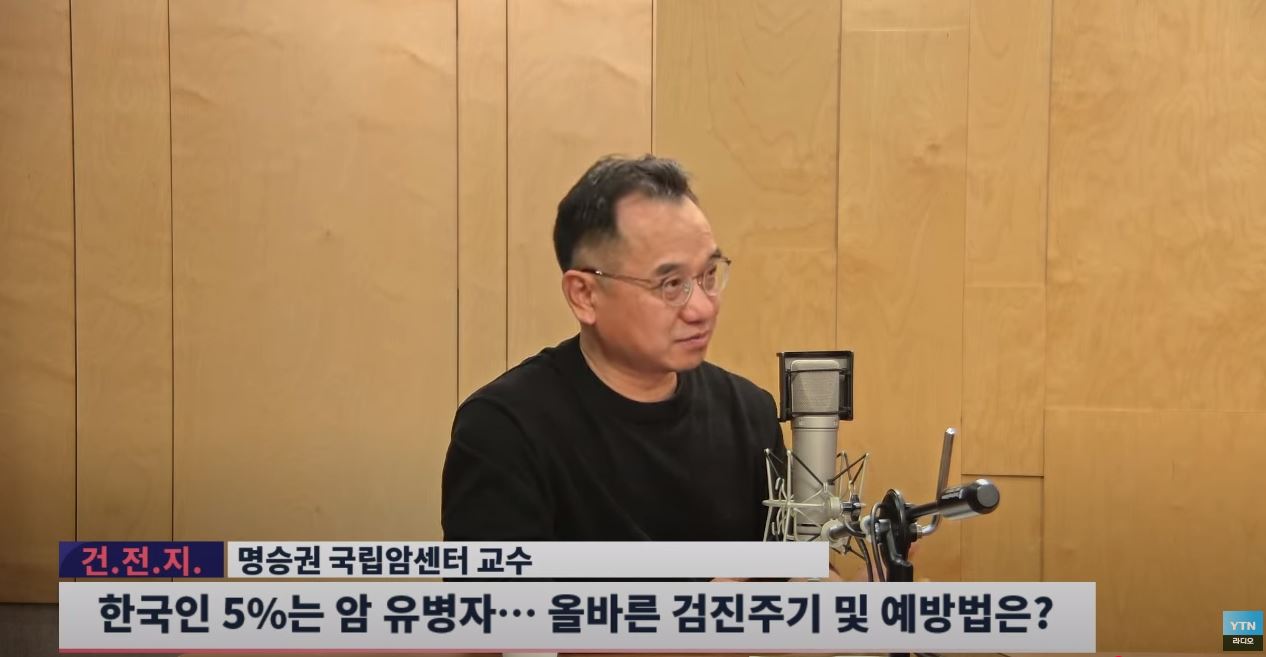□ Broadcast Date: December 27, 2024 (Fri)
□ Host: Lee Ik-seon, Choi Soo-young
□ Performer: Myung Seung-kwon, Professor of the National Cancer Center
* The text below may differ from the actual broadcast content, so please check the broadcast for more accurate information.
◆ Profitsun: Your week-long dead strength Would you like to charge here? Knowledge of health, short for batteries. The last battery of 2024 will be with Myung Seung-kwon, a professor at the National Cancer Center. Welcome, professor.
◈ Myungseung Kwon: How are you? Nice to meet you.
◆Lee Ik-seon: The Ministry of Health and Welfare and the National Cancer Center released national cancer statistics together yesterday. Today, based on the data, we will look at the terrifying disease of cancer, the number one cause of death in Korea. If you have any questions about this, could you please text me? Text, YTN application, and YouTube comment window are open for free. You have to ask us a question quickly so that we can answer it before we finish the program. First, let's take a look at the current status of cancer patients in Korea. What was the most common cancer?
◇Choi Sooyoung: What is it? Lung cancer?
◈ Myungseung Kwon: I think that's right. This national cancer registration statistics is released at the end of December every year. The Ministry of Health and Welfare, and the National Cancer Center, where I work. The Central Cancer Registry is located in the National Cancer Center. We're going to make a joint announcement. The most up-to-date material is just two years ago. So we're going to release the national cancer registration statistics over the course of 2022, how many cases have occurred, how many have survived, and how many cancer patients do we have now? So if you look at the number of new cancer cases, there were 282,247 cases in a year, and now about 280,000. Compared to the previous year, 2021, it decreased slightly. About 154 people. But actually, cancer was on the rise. According to the ranking, thyroid cancer was the most common. Thyroid cancer occurred in 33,000 cases, down 4.8% from the previous year, and the overall number of cancer patients decreased slightly, in my opinion, due to a slight decrease in thyroid cancer. After that, colon cancer, lung cancer, breast cancer, stomach cancer, and prostate cancer are in order. If you have any other questions, then the survival rate of the person diagnosed with cancer after 5 years. Usually, if you survive for about five years, you usually make a complete recovery. The survival rate is expressed as a five-year relative survival rate. The reason why I use the word "opponent" here is because... When you just target ordinary people who don't have cancer, can't these people also die for a variety of other reasons after 5 years? Compared to that, it compared how long cancer patients survive five years after being diagnosed. If you look at the survival rate, it's 72.9%.
◇Choi Soo-young: That means three out of four have survived for more than five years.
◈ Myung Seung-kwon: But 30 years ago, in the early 1990s, it was 42.9%.
◇Choi Soo-young: 1 out of 2 people...
◈Myeongseung Kwan: So the survival rate has almost doubled over the past 30 years. One of the reasons is that it was discovered in a state with a high treatment rate very early through early screening and cured, which is very important, and the development of medical technology for 30 years also played a role. But one of the unique things is that the average now is 72%. However, the relative survival rate varies slightly for each carcinoma, but it must be different. One of the lowest survival rates is pancreatic cancer. There are a number of reasons. And it's not easy to detect early, so it's in the early-mid 10% range. Conversely, the reason why cancer with a very high relative survival rate belongs to the axis of cancer includes prostate cancer, breast cancer, and stomach cancer in the case of early gastric cancer.
◆ Lee Ik-seon: Isn't thyroid cancer the number one?
◈ Scenario: Those things usually have survival rates up to 90%, but higher than that is thyroid cancer. What is the relative survival rate of thyroid cancer? It's 100.1%.
◇Choi Soo-young: Isn't that nonsense?
◈ Myung Seung-kwon: That's why I told you in advance about your opponent's survival. The reason for using survival is that people diagnosed with thyroid cancer survive relatively a little longer than those in the general population.
◇Choi Soo-young: You're right. But I think there will be some differences between men and women.
◈ Myeongseung Kwon: There is a difference between men and women. There are a lot of men. Out of 280,000, there will be 147,000 men and 134,000 women.
◇Choi Soo-young: There's not much difference.
◈ Myeongseung Kwon: It's almost the same, but there are a lot of men. And it's a little different from cancer that occurs a lot in men and cancer that occurs a lot in women. In men, lung cancer, prostate cancer, colon cancer, stomach cancer, and liver cancer are in order. The lungs and prostate are similar, accounting for about 13% and 14%. For women, breast cancer is now the highest, followed by thyroid cancer, colon cancer, lung cancer, and stomach cancer.
◆ Lee Ik-seon: I see. The problem is the composition of the population. If the population aged 65 or older accounts for more than 20% of the total population, it is classified as a super-aged society. It is known that Korea has already entered a super-aged society. Perhaps that's why I heard that the incidence of cancer, which usually occurs in the elderly, has increased. What cancers are more common in older people?
◈ Myungseung Kwon: I need to check one thing first. Just a few days ago, the Ministry of Public Administration and Security said, "As of the 23rd, the number of people aged 65 or older is finally 230,000. It accounts for only 20.0% of the total population of 51.22 million. It was announced on the 24th. Christmas I also saw the press release, and if you look at the press release, However, there is no mention of a super-aged society at all.
◇Choi Soo-young: This is a super-aged society. It's decided by the United Nations.
◈ Myungseung Kwon: That's the problem. Most of them are now reporting this, regardless of whether it's Google or CNN or Korea's newspapers, if more than 7% of the population aged 65 or older exceeds 7% in the United Nations and the United Nations, an aging society. An aged society with 14 percent or more. Then, more than 20% is known as a super-aged society. This is lacking in evidence. I looked into this part, and Choi Sung-jae, a professor emeritus of the Department of Social Welfare at Seoul National University, who was the former Secretary-General of the International Association for Aging and Geriatrics, is an expert in this part, so there is no academic basis for that. So last year, in December, I wrote an e-mail directly to the UN Economic and Social Council in English and inquired. However, the answer was that the UN had never officially classified it like that. So, if you look for its origin, it began to appear in Korean media about 10 years ago. There are a lot of reports like that, mainly in Japan and Korea. In particular, in the case of Japan, such terms came out because it exceeded 20% much earlier than Korea. I'm not sure, but it's going to be more than a few percent like that in the 1950s. There were these prospects. That's right. As it is now, there is no official distinction between 7% and 14%, 14% or more is an aged society, and 20% or more is a super-aged society.
◆Lee Ik-seon: Then how about this? It's about changing the standards of old age.
◈ Myung Seung-kwon: Those are now being raised academically as well. Because the average age increases. For your information, the so-called super-aged society, which is more than 20%, is what we talked about earlier. Japan was the first country to enter, followed by Italy, Finland, Germany, Greece, Sweden, France, Hong Kong, Austria, and Korea.
◆Lee Ik-seon: We weren't second.
◈ Myeongseung Kwon: I'm not second place. And most common cancers. As I get older, the question from before is bound to arise a lot. Most recently, thyroid cancer, breast cancer, and prostate cancer are continuously increasing. On the other hand, colon cancer, stomach cancer, liver cancer, and lung cancer are continuously decreasing. In our country.
◇Choi Soo-young: I see. There is an article that if we live to life expectancy, there is a probability of cancer in 2 out of 5 men and 1 out of 3 women. But what is the life expectancy?
◈Myeongseung Kwon: Don't you use the expression "life expectancy" or "life expectancy"? It's announced like this every year. For example, in the previous year, the 0-year-old population lived, the ages of 1, 2, 3, 80, on average, in the age group, and then distributed again. Based on the age of 0, the remaining life expectancy is called life expectancy, and for example, a person aged 70 uses the expression life expectancy. If you live for the next few years, what is your life expectancy, or life expectancy, based on the age of zero? As of 2022, men are 79.9 years old. Women are 85.6 years old, about 5 to 6 years older than this. But there's something interesting. In fact, this life expectancy has been continuously increasing in our country.
◆ Profit line: It's being delayed.
◈ Myeongseung Kwon: In 2021, the man was 80.6 years old. But what did I just say? In 2022, it was lowered to 79 years old and 79.9 years old. In the case of women, they were originally 86.6 years old, but the age decreased by 1 year to 85.6 in 22. What's the reason? It can be estimated. It's related to what we just covered. Wasn't there more than 25,000 people who died in a year because of COVID-19? So that's why I'm averaging the way I calculate life expectancy, how much I lived in each age group that year. Anyway, in 2023, as in 2021, men are 80.6 years old, women are 86. I came back to the age of four. As you just said, roughly 40% of men get cancer when they live to the average life expectancy of about 80. In the case of women, it takes 33% to 34% when they say they live to the age of 86. You can understand that.
◇Choi Soo-young: To prevent cancer, we need to know the cause of cancer. But smoking, drinking, eating habits, and infections are what we know roughly, is there anything else?
◈ Myungseung Kwon: As you know. In fact, according to what has been revealed so far, smoking accounts for about 30% and more than 30% of food factors. In addition, it is the third chronic infection, so viruses and bacteria enter our body. So in the case of liver cancer, the hepatitis B virus or the hepatitis C virus is the most important cause, and in the case of cervical cancer in women, the human papillomavirus is the important cause. So this smoking, food, chronic infection are the most important factors and other genetic factors. There are drinking environmental pollution and radiation, but this accounts for less than 5%. Many people misunderstand that genetic factors are considered a lot, but the family history is only about 5% of genetic factors. The rest are common lifestyles, eating habits, and so on.
◆ Lee Ik-seon: Isn't stress the number one?
◈ Scenario: Stress is known to contribute to some extent, but it has not been formally proven to be the cause of cancer at this time.
◆ Lee Ik-seon: Then what kind of first-class carcinogens did the International Cancer Institute choose?
◈ Myungseung Kwon: This part needs to be revised. Usually, in the media, if it is a first-class carcinogen, then it is a second-class carcinogen or a third-class carcinogen, but that's not it. To do it properly, we have group 1, we have group 2, and we have group 3, and so on. This is a category. So we can translate Group 1 as Group 1. Not only in experimental animals but also in human studies, the first group of substances that have been clearly found to cause cancer. It refers to carcinogens. And there are a and b in the second team. Group 2 a is difficult to see as a complete carcinogen, but classified and estimated as a presumptive carcinogen. Then, in the case of group 2 b, carcinogens are possible. It's possible and in the case of the last three groups, it can't be seen as a carcinogen. It's classified like this.
What group one, known as carcinogens, do you know well? Smoking, drinking, Helicobacter pylori, human papilloma, virus processed meat, and so on. We also have processed meat benzene asbestos. Next, second tier a. Red meat, such as beef lamb, is known to be a carcinogen. Next, a very hot drink. But it's classified as not coffee. The next thing that falls under b of the second group. Gasoline emitted from the engine after electromagnetic waves using mobile phones is classified as a carcinogen, although the carcinogen is not clearly identified, and finally, group 3 has the most. Coffee and caffeine acrylic fiber can't be seen as carcinogens.
◆ Interest line: Electromagnetic waves are shocks. How close we use our phones for how long.
◈ Scenario: This was classified in 2011 by the International Cancer Institute, or the International Cancer Institute under the World Health Organization. It's still controversial.
◇Choi Soo-young: I just got a text message from the listener, "It's been hard this year. I'm in the third stage of rectal cancer treatment. What kind of care will be needed after the development of cancer? ’ How can you answer that?
◈ Myungseung Kwon: First of all, if it's 3, it's a little progressed. However, you can understand that there is no significant difference in general lifestyle rules, whether it is stage 1, stage 2, stage 3, cancer patients, or health. In conclusion, it's good to try to eat this and that food as well. There's no particularly better food for cancer. So I told you the cause of cancer earlier, but I think we can pay attention to about 7 things if we organize a little. It's so obvious. I don't smoke, then I don't drink much, and I'm trying to maintain my standard weight. I try to exercise regularly and eat various fruits and vegetables without eating too salty. Lastly, I don't eat too much red meat. This will also be a general rule that applies to cancer patients.
◆Lee Ik-seon: Listener, "I'm a woman in her mid-60s, and I was recently confirmed to have colon cancer. I'm a multi-cancer patient and this is the fifth time I've been diagnosed with cancer every few years since I was first diagnosed with it at 35. I'm worried about my daughter in her 20s. Is it correct that people diagnosed with cancer before the age of 40 are more likely to have a family history? ’
◈ Seung-kwon: In general, colonoscopy is recommended every 5 to 10 years for colorectal cancer over the age of 50. If the age of cancer patients among parents and siblings occurs when they are under 55, or if two or more of their parents have colorectal cancer, it is recommended to start colonoscopy early every five years from the age of 40 instead of 50.
◇Choi Soo-young: But the genetic probability, so I'm very curious about the probability, what about the probability?
◈ Myeongseung Kwon: That's less than 5% of the common genetic cause, but it can be as high as 10%. But in cases like now, this colorectal cancer may be a category of hereditary cancer. You have to do a genetic test for that. In such cases, the probability may be a little higher, so in such cases, your family should consult with your doctor.
◆Lee Ik-seon: Early diagnosis is really important for cancer. You have to get regular checkups like that since 1999,
Now the country is running a cancer screening business, and I heard that the examination rate is lower than I thought.
◈ Myeongseung Kwon: I think some articles came out recently. Recently, as the national cancer registration statistics were released, the examination rate was announced. According to the report, when we first started in 2002, the supply rate of cancer screening was less than 30% to 40%, but recently, it has risen to more than 70% and 75% in 2022. However, there are still less than 68% to 70% of breast cancer. It's 65%, but I'd like more people to get cancer checkups like that conducted by the state. This is because your own burden rate is less than a few percent. This is notified because the country is providing a lot of things. Then don't forget to get tested on time.
◇Choi Soo-young: I heard that one of the common things we don't know is the national cancer prevention rule, so please introduce this.
◈ Myungseung Kwon: The Ministry of Health and Welfare and the Korean Cancer Center have enacted about 10 rules for preventing cancer. According to that, the most important thing is that it includes everything I talked about earlier. After quitting smoking, eating vegetables and fruits evenly, avoiding burnt foods, and drinking alcohol are supposed to be avoided altogether if possible to prevent cancer. Previously, men had two cups and women had one, but recently, there are reports that the risk of breast cancer, especially for women, increases colorectal cancer, so if it is aimed at preventing cancer, refrain from drinking if possible.
◇ Choi Soo-young: Don't drink and don't smoke. This seems like a bible, but it's hard to keep.
◈ Myungseung Kwon: It's hard. But I have to try my best. In addition, exercise, standard weight maintenance, and vaccination are now included in the national cancer prevention rules.
◆Lee Ik-seon: Do you not smoke?
◈ Myungseung Kwon: I won't. I'm the chairman of the Anti-smoking Movement Council.
◆ Lee Ik-seon: Do you drink?
◈Myeongseung Kwon: Not this week. It should be described as proper drinking. Sometimes it may violate that, but I'm doing my best.
◆Lee Ik-seon: Dear listener, 'You said that electronic devices are also related to wind, then can Bluetooth earphones be a problem? I listen to it every day. 2 hours.
◈ Myungseung Kwon: So earphones with strings are still less dangerous. Because I'm away from my phone. In the case of Bluetooth, a small amount of electromagnetic waves can occur, so we are still studying that part.
◆Lee Ik-seon: It's a little better than putting your phone directly to your ears.
◈ Myung Seung-kwon: I can make that assumption, but I think we need to do some research on this.
◇Choi Soo-young: Let me introduce a story. Dear listener, "You told me to be careful about losing muscles as I get older and to eat meat side dishes, so I enjoy eating it. Not long ago, I had a colonoscopy and the doctor said I had 6 polyps and told me to reduce my meat intake. Is there an appropriate amount of meat consumed in a healthy way? ’
◈Raise ticket: It's not clear, but for now, it's about 70 grams per day. In terms of a week, I think it's safe up to 500g.
◇Choi Soo-young: 500g a week.
◈Myeongseung Kwon: In many European countries and in Korea, so in the case of Korean people, how much do they eat? About 65g.
◆Lee Ik-seon: Will it be about 2 eggs?
◈ Myeongseung Kwon: For example, in the case of pork belly, if 150g is a single serving, then it's a little more than 3 servings. So, the amount per day is 70g per week, and it's about 500g per week.
So the point is, It means that the average amount of food in our country is safe. For those who go to a lot of company dinners and eat a lot of meat, of course, the amount is bound to increase. So, it's not a big problem for Korean people to eat on average, so you don't have to worry much. However, the problem is that eating too often can increase the risk of colon cancer.
◆ Lee Ik-seon: Since a serving is 150g, what is the recommended daily amount for about half?
◈ Myungseung Kwon: But it's hard to do it while calculating one by one. But there's a basic diet for Korean people, right? Sometimes I eat meat side dishes, eggs, and sometimes I go outside and eat meat. The average is 65g. So don't worry too much and think that you don't eat too much.
◆Lee Ik-seon: What about fish instead?
◈ Myungseung Kwon: That's okay.
◆Lee Ik-seon: White flesh fish.
◈ Myeongseung Kwon: Fish are actually rich in omega-3s, so I recommend about two slices a week. One slice is about the size of the palm. So, I generally recommend one or two slices a week.
◇Choi Soo-young: Okay. Let's look at another one. Dear listener, "I heard liver cancer can recur easily after treatment, so why?"
◈ Myung Seung-kwon: In the case of liver cancer, what did you say was the cause? Hepatitis b virus, hepatitis c virus, and now it's caused by cirrhosis or cirrhosis, so people who don't have this disease are not subject to liver cancer screening at all. There is generally little need to worry about it. However, most people with liver cancer have these risk factors, but it works well in the beginning because the treatment went well. Even if it's done, there are many cases where this state remains. There's a possibility that the hepatitis b virus or the hepatitis c virus remains. Therefore, it is known that the risk of recurrence is a little high.
◇Choi Soo-young: Listener, I'm a woman in my 60s. Emotional ups and downs after breast cancer treatment are very severe. Is it because I can't control my hormones? It seems to be similar to the symptoms of menopause. Also, after radiation therapy, I feel extremely tired and want to lie down. I wonder if this is also a normal response. ’ They gave it to me.
◈ Myung-Seung-Kwon: This could be a treatment-related symptom. Emotional ups and downs can be due to a drop in female hormone levels, but it can also be due to depression. There must be because depression can occur secondary to the cancer itself in the process of being diagnosed and treated. In this case, of course, mental health treatment is required.
◇Choi Soo-young: So this could be the after-effect of the cancer treatment, but could the ups and downs come again?
◈ Myeongseung Kwon: No. Cancer treatment can also cause emotional ups and downs, and that may be the source of depression, so consult a doctor for discrimination and take medicine to get better if you are depressed.
◆Lee Ik-seon: It's almost time to wrap up the year, so people who are preparing for the new year make a lot of resolutions. Do you have any New Year's greetings from Professor Myung Seung-kwon of the National Cancer Center?
◈ Myungseung Kwon: I mentioned it earlier. I think the right lifestyle is the most important thing. I don't recommend a personal checkup that costs 1 million won or 2 million won. There is also a lack of evidence, so it is the right life to prevent biennial industrial complex checkups and cancer checkups conducted by the state, along with life-style diseases such as cancer, hypertension, diabetes and hyperlipidemia, and seven things I mentioned earlier. Smoking, abstaining from alcohol, obesity, weight, eating fruits and vegetables evenly, not eating salty, not eating too much meat. If you do these seven things. Hypertension Diabetes Hyperlipidemia Since it has a higher probability of preventing cancer as well as common diseases, I hope you don't spend money and maintain your health with the right lifestyle next year.
◆Lee Ik-seon: I went for a checkup, would you like to pay for it? Would you like to take it as a non-payment? Is there anything better to do?
◈ Myung Seung-kwon: I don't know if each hospital hates me, but the national health examination and national examination are a little lacking in evidence, but in the case of national cancer checkups, there is some evidence, so I hope you get a regular checkup.
◆ Proficiency line: I see. With Professor Myung Seung-kwon of the National Cancer Center, I shared my general knowledge and suggestions about cancer today. Thank you for today and see you in the new year. Thank you.
[Copyright holder (c) YTN Unauthorized reproduction, redistribution and use of AI data prohibited]
Science
More- Air inside the Hanbit 6 containment, without radiation monitoring...Nuclear Safety and Security Commission to investigate
- I'll fly it to you!Development of Hoverbike for Flying Motorcycles
- Moderate drinking, good for depression...The more you drink, the greater the risk of suicide.
- Developing an AI model that accurately predicts changes in Arctic sea ice a year later.










